It’s hard to shake this one off. Seems to have that effect on people. I walked into this game with pretty high expectations, given the pedigree of its creators. I grew up on Crash Bandicoot (it’s kind of hilarious to think that the same people made those games). I never screwed around too much with Jak and Daxter, but I have an extreme fondness for all three Uncharted games, particularly 2 and 3, and often cite them as probably my favorite modern adventure games. All that being said though, The Last of Us is without a doubt Naughty Dog’s crowning achievement. There’s something hard to place about it; it slowly takes you in, bit by bit, and by the time it has you, before you know what’s happening, this game will beat the shit out of you. And I’m not just referring to difficulty, though there are plenty a tense encounter to be sure. I mean emotionally. This game will take your heart and piss on it.
The guys over at Extra Credits (which you should be watching if you aren’t already) have done a couple episodes on survival horror, talking about what exactly a game does to be classed in that category, and largely their thesis is that survival horror games take us into disempowerment fantasies, which is a profoundly different goal than that of most other games. Now, I wouldn’t call The Last of Us a survival horror game. And in fact, I’ve heard multiple people refer to it as a “zombie game,” and I think that is doing it a profound disservice, because the least accurate thing imaginable would be to lump this in with games like Dead Rising and Dead Island. Or even Resident Evil for that matter. That being said, the game still uses some of those survival horror tropes, limited ammo, degrading weapons, etc., but instead of using those mechanics to create an atmosphere of fear, they are used to create an atmosphere of extreme, absolute hopelessness.
There are only a select few games that have openings as memorable and effective as this. Fallout 3 and the first Bioshock both come to mind. But The Last of Us forces you to play through what is literally the beginning of the end of the world, the opening minutes of the apocalypse, as an 11-year-old girl. True disempowerment. It is terrifying, and incredibly disturbing; walking around your house, trying to find your dad, feeling utterly helpless. And it pretty much just keeps going downhill from there on out.
The only beacons of light that make their way through that bleak quagmire are the characters. And holy god did I come to care for these people. Even in my favorite games, most of which are narrative-driven, games like the Mass Effect series or Metal Gear Solid, with only a select few characters are you ever doing more than putting up with the voice acting. The exceptions to this, like Portal 2 or Bioshock Infinite, are incredibly few and far between. The acting and writing in The Last of Us, a bare few ham-handed lines of dialogue aside, should stand as a shining example for the rest of the industry. I’m not saying this game is at all trying to be a film (that would be a great mistake as I’m sure we’ve all seen), but this is I think the first game I’ve ever seen with scenes that are up to snuff with what you’d see in some of Hollywood’s better offerings. In fact, if you’re comparing it to any of the big summer tentpoles that the film industry continues to vomit out every year, the acting and writing in The Last of Us is better by a large margin.
The world and plot take cues from almost all the better apocalypse fare in recent years, but, surprisingly, more from film and fiction than from other games. Part Children of Men, part The Road, part 28 Days Later, and even with some elements of I Am Legend, The Last of Us is a sprawling homage to the very best of these world’s-end imaginings. Still, more than anything else, this is a game about being a father. After the game’s opening moments we are brought 20 years into the future to see a world torn apart by a rampaging fungal infection that has taken with it the majority of the human population. The remnants of humanity either cling to some semblance of civilization in a dwindling number of police-state quarantine zones, or brave the wild in-between. Joel, in the years since the catastrophe destroyed his daughter and his life, has turned to gun-running in the Boston metro area, in what is presumably one of the last intact quarantine zones. Following a series of events he is tasked with smuggling a young girl, Ellie, to a resistance movement called the Fireflies who are holed up at a university in eastern Colorado. You soon discover Ellie is apparently immune to the infection, and the resistance needs her for study to try to find a cure.
Obviously the plot here is not attempting to avoid any of the genre’s tropes, nor is every character a study in originality; Joel is the gruff older man, mute over his unimaginable loss, Ellie the quippy teenager poised to bring him out of his reverie. But the world is so beautifully and lovingly constructed, and the characters so well crafted and acted, that it just doesn’t matter. It simply works. They will get under your skin whether you like it or not.
Once out of the quarantine zone you quickly encounter the game’s different enemy types. The infected are grouped into three main classes, marked by different stages of infection. The first, Runners, are essentially rabid humans that will sprint and come clawing as soon as they’re aware of you. The next, Clickers, have heads that have been overtaken by spongy, fungal growths, almost floral in appearance. They are blind, and use echo-location to find their way around, hence the moniker. While they can’t see you, they have incredibly sharp hearing and will one-hit kill if they get in range. The final stage of infection produces Bloaters, massive founts of infection with fungal plates that have covered them and hardened into something like armor, with the ability to spit projectile spore-bombs.
Just as dangerous as any group of infected are the humans you will encounter, willing to kill you for any spare bit of food or ammo. Some of the tensest moments in the game will come from these encounters, thanks to the exceptional AI, as any group will immediately scatter and attempt to flank you. It is not remotely uncommon to have a guy in your crosshairs, your aim weaving, just about the pull the trigger, only to be bludgeoned over the head from behind, segueing instantly into a tense melee struggle that ends in blood.
Combat is split between stealth, melee, and a cover-based shooting system. While crouched, when coming up behind an enemy, humans and Runners can either be strangled, which takes a good second and is a bit noisy, or instantly and quietly taken down with a shiv to the throat (the shivs however will break after a single use until they are upgraded). Clickers can only be taken down this way with shivs. The shooting mechanics are solid, and by the end of the game you’ll be equipped with a modest little arsenal, but it stays conservative enough that it doesn’t feel out of place given the setting, and your aim weaves just enough that given the scarcity of ammo you’ll damn well make sure every shot counts. Using different weapon types is encouraged, and I found myself constantly experimenting, never bored with my options. Hand-to-hand melee is contextual, and if you back an enemy up against a wall or a counter Joel will dutifully bash their skull in (the heads of the infected tend to pop open like rancid eggs, generally eliciting a sincere “Fuck!” from Ellie). You can also pick up various melee weapons such as 2×4’s, bats, metal pipes, and eventually machetes and axes, all of which will degrade and break after a certain amount of use.
In combat, more often than not, your carefully laid plans will go to hell at a moment’s notice, encouraging improvisation and a “just roll with it” type of mentality as opposed to loading your previous save and attempting a perfect run-through. This makes for some spectacularly bombastic sequences of impulsive, brutal violence. I will say though, The Last of Us has the same philosophy towards player death as the Bioshock games, where enemies you’ve already killed stay dead once you respawn even if you haven’t played all the way through an encounter, and it’s a degree of hand-holding I certainly could have down without. And on that subject, as with so many other modern games, if you take more than a couple minutes to figure out a puzzle the answer pops up onscreen, with a snippet of text and an indicator arrow telling you where to go. Death to that shit, seriously.
There’s a pretty decent crafting system, necessitating that you’re constantly scavenging the world for usable material. Joel can make all manner of items with the right components; med kits, shivs, molotov cocktails, nail bombs, smoke bombs, etc. All of the crafting takes place in real time, so you’ll have to be careful you’re not in any danger before crouching down and opening up your pack, but all menus involved in the process are simple, easy to understand, and necessitate only the barest amount of time spent navigating them. Certain components are necessary to craft multiple item types, so you’ll have to balance and weigh your decisions. Should you use the alcohol and rags you have to make a molotov cocktail, or is it more important to have an extra med kit? Should you use the blades you’ve collected to craft a makeshift shrapnel grenade, or will that leave you with no shivs the next time you’re in a dark room full of Clickers?
One of the most difficult things about this game emotionally, is that through all this horrific violence, you’re very aware that you have a 14-year-old with you as a companion, and that you are exposing her to all the horror of this world; that even with so few humans left, the uninfected still brutally kill each other for survival.
As a companion, it is exceptional how little of a hindrance Ellie is mechanically. She’s actually less annoying than Bioshock Infinite‘s Elizabeth as she’s not constantly peppering you with items, and I didn’t once see her get stuck on a piece of geometry as was so common with escort missions in days of yore. Most impressively, I rarely if ever heard her reactions to environmental cues loop. While I’m sure I must have heard the same “Fuck!” come out of her mouth a handful of times, the acting is so genuine that I didn’t even notice. Equally impressive, when searching through abandoned houses for supplies I would often come back downstairs to find her idly flipping through bookshelves and ducking down to search beneath couches instead of just standing awkwardly in the middle of the living room. These environmental interactions seemed so natural it took me seeing it a couple times to even realize it was happening. Initially Ellie will help out during combat by chucking bricks and bottles strewn around the environment at enemies, and after a certain point in the game Joel will come to trust her enough to give her a gun, after which she’ll join in the shooting. And this again is its own conflict. While she’s actually a help, the whole while you are made very aware that you are forcing a little girl to kill for you.
The slow bond that grows between Joel and Ellie is absolutely the high point of the game. Their little conversations as they traverse the continent, her asking him about the world before, or talking just for the sake of company, cause a real, lasting effect on the player, at least in my experience. You grow scared for her, and you grow to truly care for her. And while she can for the most part hold her own, every time she would be grabbed by an enemy during combat, my inner monologue read the same: get off her you fucker. Don’t you dare touch her. I really can’t say something like that about very many games.
The game does have some problems I feel I should mention. Firstly, for whatever reason, while enemies will instantly react to loud noises or sudden movements made by the player character, the various NPC’s who accompany you throughout your journey, including Ellie, seem to be able to stomp around with little consequence, instantly breaking the immersion. While this doesn’t happen in every encounter by any means, they will occasionally say something at a normal volume while you’re sneaking, or be seen running nonchalantly past a Clicker, without anything adverse occurring. While I understand and appreciate that enemies don’t react to this (as it would make stealth sections of the game incredibly frustrating), given that the AI of the NPC’s in every other area of the game is so stellar, I don’t see why they act this way in front of enemies to begin with.
The other main issue is basically this: Naughty Dog has done such an amazing job of bringing this world to life that the couple elements of the experience that seem overly “gamey” stick out like sore thumbs. Joel has an upgrade system which allows him to slowly improve certain skills over the course of the game. While nothing is wrong with this on the face of it, and while I enjoyed the measured pacing of this progression, it seems a little silly, given the seriousness of the world, that you collect random supplements and little purple potted plants to put towards these upgrades. I would have much preferred some sort of under-the-hood experience system or something that either let these skills improve on their own or at least didn’t require collection of an outside source. Also, when scavenging for crafting components, it eventually starts to seem a little odd that the only items you ever pick up can be attributed to one of the handful of items you are able to craft, and that every house you walk into has spare scissor blades and sacks of sugar or fertilizer lying around. I would have preferred something almost like the item collection in Skyrim, where there are plenty of items around to pick up, but also plenty that have absolutely no use; I think that would have seemed more natural in a gutted world like this. I’m also a bit surprised they didn’t go for the HUD-free approach. Games like Metro: Last Light have done this in similar settings to great effect. While the minor HUD that is present is certainly inoffensive, it still seems a strange choice given the tone that’s been set. The only thing I can think is that it’s perhaps easier to naturally integrate information like health and ammo into the environment in a first-person perspective than it is in the third.
All that being said, visually the game is a masterpiece and hands-down the best looking thing on consoles right now. Much like the Uncharted games before it, The Last of Us literally makes other brand new games look dated. Every area has been crafted with the ultimate care and attention, and the little details astound. There’s a constant push/pull conflict of wanting to stay and admire every inch of the environment while simultaneously feeling the urgent immediacy of the conflict at hand at all times. The sound design is spectacular, and the score is subtle and effective. Every character you meet along the way is memorable and beautifully defined, and the pacing of the narrative is largely dictated by the personalities of your varied companions. As the seasons change, so does the world, and whether you’re walking aimlessly through cities baking in the summer heat, riding horseback through the woods in the rain, or stalking a wounded deer through the snow, the world is bursting with life, subtlety and attention to detail.
Above all else though, what really drives the point home is the game’s ending. From here on out this review will contain spoilers, so if you don’t want to be spoiled I’d check out here. Once again:
SPOILERS BEYOND THIS POINT:
It is not an uncommon plot device in stories like this, and in science fiction, for a character to be left with the burden of weighing the life of one against the lives of many. In every other case until now, I have always found myself taking the side of the cold pragmatist. I always say kill ’em. Save everybody. It’s a numbers game.
In the final hour of The Last of Us, once you finally reach the location of the Fireflies at their new base in Salt Lake, it is revealed to you that the infection has mutated inside of Ellie, and that by extracting the mutated fungus from her body, a vaccine can be created. A real cure. However, as with all other victims of infection, the fungus has centered in her brain, and to take it out will kill her. One life for the lives of many. And while this is a linear narrative, and as such the player is not given the option of making their own decision, within bare seconds of receiving this information I knew my choice. Fuck you. That little girl in the next room is the only bright thing in this entire terrible world. I’ve already lost one daughter. Fuck you.
By this point, not only have you grown to care greatly for Ellie as a character, and for how Joel feels towards her, you have spent the last 20 or so hours experiencing just what humanity is really like. Cutthroat fuckers who will kill you for a can of soup, rape your daughter and then eat her. Fuck humanity. The choice is obvious. It’s not even a choice.
I was beyond shocked and beyond thrilled that the game did not stop me from acting out these compulsions. It agreed with me. After killing the guard escorting me out of the facility, I felt no remorse whatsoever as I stalked into Ellie’s operating room and shot down the unarmed doctors. They called me an animal, and I put them down like dogs.
As Joel knows Ellie would willingly sacrifice herself a thousand times over if it would save what’s left of humanity, when she wakes in the car on the return journey, Joel lies to her. He says there were dozens like her, immune to the infection. The Fireflies didn’t even need her. In the final moment of the game as they return to an up-and-running hydro-electric dam where Joel’s brother and his wife have holed up with a group of other survivors to start a self-sustaining community, Joel helps Ellie one last time over the lip of an embankment, and he says “I got you.” Those three words sum up the whole experience for me. “I got you.” Ellie pauses and asks Joel one last time, was what he said about the Fireflies true? Does he swear? He says yes. And she says okay. Ellie is alive and the world keeps spinning, just as it should be.
Over the next couple days I played that last scene out in my head over and over, and every time it made me smile.
END OF SPOILERS
I’m sorry to get so gushy about two games in a row, but I guess there’s worse things to complain about than having amazing output from the industry more than once a year. If you have some urgent desire to see me hate something, you can go back and read my review of Max Payne 3, or PM me and ask about fedoras or the Dave Matthews Band. But barring that, just go play The Last of Us.

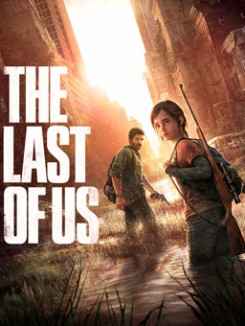
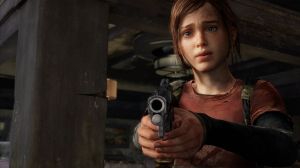
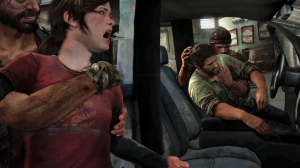
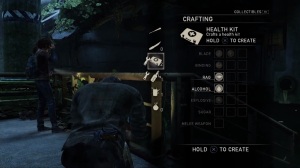
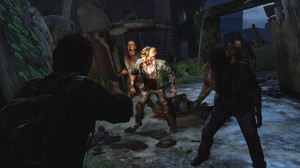
“But The Last of Us forces you to play through what is literally the beginning of the end of the world, the opening minutes of the apocalypse, as an 11-year-old girl. True disempowerment. It is terrifying, and incredibly disturbing; walking around your house, trying to find your dad, feeling utterly helpless. And it pretty much just keeps going downhill from there on out.”
Now this is where I’m going to have to disagree with you. It’s true that the opening of the game strips power away from you (and effectively, at that), but to me, the game failed to follow through on the “tension” so often mentioned by others — and with it, the element of weakness is missing as well. It’s hard to think of Joel as vulnerable and/or against the odds when he has access to instant-kills on the better part of the game’s population of enemies, and doubly so when he starts carrying around a flamethrower. For me, that just completely broke the atmosphere and illusion the game was trying to create — I wasn’t trying to “endure and survive”, but “clear out this room and get to the next area”.
It’s possible that I’m missing the point of TLoU by a pretty wide margin — I’ve been trying to sort out all my feelings on it over the past month via blog posts — but as it stands, I can’t quite share the enthusiasm you and others have shown for the game. I’m not saying you’re wrong; I’m just saying it’s not (and never was, technically) the game for me…but even so, the fact that it didn’t manage to win me over comes off as a bitter disappointment.
I agree with some of what you’re saying, and while the flamethrower was certainly helpful for those last couple bloater fights, that could probably get filed under the “gamier” aspects I mentioned. For me personally though, the strength of the narrative ultimately outshined those issues. But to each their own. At the very least the game seems to be spawning intelligent discussion, and that’s a very good thing!
I haven’t played the game but I’ve seen an entire play through of it and here were some of my favorites (all spoilers so b careful):
1. Ellie cursing up a storm. It’s not like some Holden Caulfield shit where you feel like, “Man, this sissy kid needs to shut up,” it’s more like, “It’s not your fault ppl in your life aren’t immune like you are, so you’re gonna experience a lot of fucked up things real fast in this world.” It’s just a real nature diction for a 14 year old to have, I dunno.
2. The giraffe motifs. That one scene, oh my god. Gotta give it up to Santaolalla for why this game feels more heartbreaking than terrorizing.
3. Joel killing Marlene and the doctors////Ellie’s “boss” fight against David. There’s ton of killing in this game and a lot of it seems really unimportant (killing clickers and bloaters cuz u gotta stay alive duh) but these two events really made me pause and I feel like, you, Lee, probably feel the same way too.
Dude. That boss fight against David. Super intense. Definitely one of most discomforting characters in the game for me. And nothing makes me happier than small children tastefully cussing.